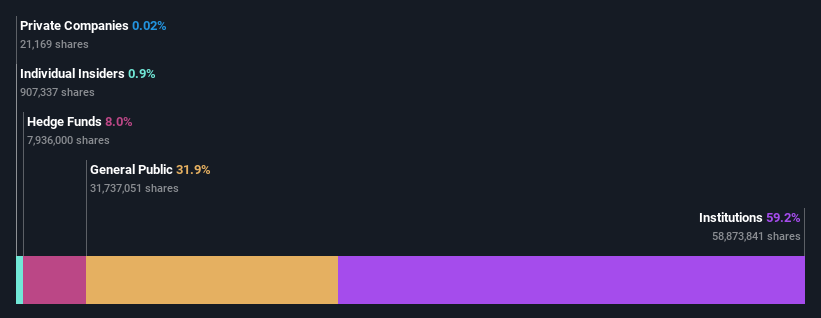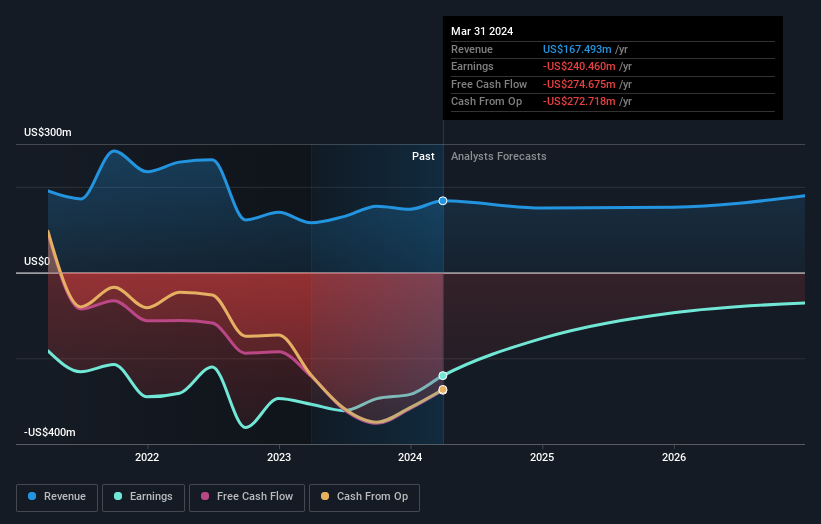- United States
- /
- Biotech
- /
- NasdaqGS:FGEN
FibroGen, Inc.'s (NASDAQ:FGEN) recent 11% pullback adds to one-year year losses, institutional owners may take drastic measures

Key Insights
- Institutions' substantial holdings in FibroGen implies that they have significant influence over the company's share price
- A total of 10 investors have a majority stake in the company with 52% ownership
- Insiders have bought recently
If you want to know who really controls FibroGen, Inc. (NASDAQ:FGEN), then you'll have to look at the makeup of its share registry. With 59% stake, institutions possess the maximum shares in the company. In other words, the group stands to gain the most (or lose the most) from their investment into the company.
And institutional investors endured the highest losses after the company's share price fell by 11% last week. Needless to say, the recent loss which further adds to the one-year loss to shareholders of 94% might not go down well especially with this category of shareholders. Also referred to as "smart money", institutions have a lot of sway over how a stock's price moves. Hence, if weakness in FibroGen's share price continues, institutional investors may feel compelled to sell the stock, which might not be ideal for individual investors.
Let's delve deeper into each type of owner of FibroGen, beginning with the chart below.
See our latest analysis for FibroGen

What Does The Institutional Ownership Tell Us About FibroGen?
Many institutions measure their performance against an index that approximates the local market. So they usually pay more attention to companies that are included in major indices.
FibroGen already has institutions on the share registry. Indeed, they own a respectable stake in the company. This implies the analysts working for those institutions have looked at the stock and they like it. But just like anyone else, they could be wrong. It is not uncommon to see a big share price drop if two large institutional investors try to sell out of a stock at the same time. So it is worth checking the past earnings trajectory of FibroGen, (below). Of course, keep in mind that there are other factors to consider, too.

Investors should note that institutions actually own more than half the company, so they can collectively wield significant power. Our data indicates that hedge funds own 8.0% of FibroGen. That catches my attention because hedge funds sometimes try to influence management, or bring about changes that will create near term value for shareholders. The company's largest shareholder is PRIMECAP Management Company, with ownership of 14%. For context, the second largest shareholder holds about 8.0% of the shares outstanding, followed by an ownership of 7.0% by the third-largest shareholder.
On further inspection, we found that more than half the company's shares are owned by the top 10 shareholders, suggesting that the interests of the larger shareholders are balanced out to an extent by the smaller ones.
While studying institutional ownership for a company can add value to your research, it is also a good practice to research analyst recommendations to get a deeper understand of a stock's expected performance. Quite a few analysts cover the stock, so you could look into forecast growth quite easily.
Insider Ownership Of FibroGen
The definition of company insiders can be subjective and does vary between jurisdictions. Our data reflects individual insiders, capturing board members at the very least. The company management answer to the board and the latter should represent the interests of shareholders. Notably, sometimes top-level managers are on the board themselves.
I generally consider insider ownership to be a good thing. However, on some occasions it makes it more difficult for other shareholders to hold the board accountable for decisions.
Our most recent data indicates that insiders own less than 1% of FibroGen, Inc.. It appears that the board holds about US$935k worth of stock. This compares to a market capitalization of US$102m. We generally like to see a board more invested. However it might be worth checking if those insiders have been buying.
General Public Ownership
With a 32% ownership, the general public, mostly comprising of individual investors, have some degree of sway over FibroGen. While this group can't necessarily call the shots, it can certainly have a real influence on how the company is run.
Next Steps:
I find it very interesting to look at who exactly owns a company. But to truly gain insight, we need to consider other information, too. To that end, you should learn about the 4 warning signs we've spotted with FibroGen (including 2 which can't be ignored) .
Ultimately the future is most important. You can access this free report on analyst forecasts for the company.
NB: Figures in this article are calculated using data from the last twelve months, which refer to the 12-month period ending on the last date of the month the financial statement is dated. This may not be consistent with full year annual report figures.
New: AI Stock Screener & Alerts
Our new AI Stock Screener scans the market every day to uncover opportunities.
• Dividend Powerhouses (3%+ Yield)
• Undervalued Small Caps with Insider Buying
• High growth Tech and AI Companies
Or build your own from over 50 metrics.
Have feedback on this article? Concerned about the content? Get in touch with us directly. Alternatively, email editorial-team (at) simplywallst.com.
This article by Simply Wall St is general in nature. We provide commentary based on historical data and analyst forecasts only using an unbiased methodology and our articles are not intended to be financial advice. It does not constitute a recommendation to buy or sell any stock, and does not take account of your objectives, or your financial situation. We aim to bring you long-term focused analysis driven by fundamental data. Note that our analysis may not factor in the latest price-sensitive company announcements or qualitative material. Simply Wall St has no position in any stocks mentioned.
Have feedback on this article? Concerned about the content? Get in touch with us directly. Alternatively, email editorial-team@simplywallst.com
About NasdaqGS:FGEN
FibroGen
A biopharmaceutical company, discovers, develops, and commercializes therapeutics to treat serious unmet medical needs.
Medium-low and fair value.


